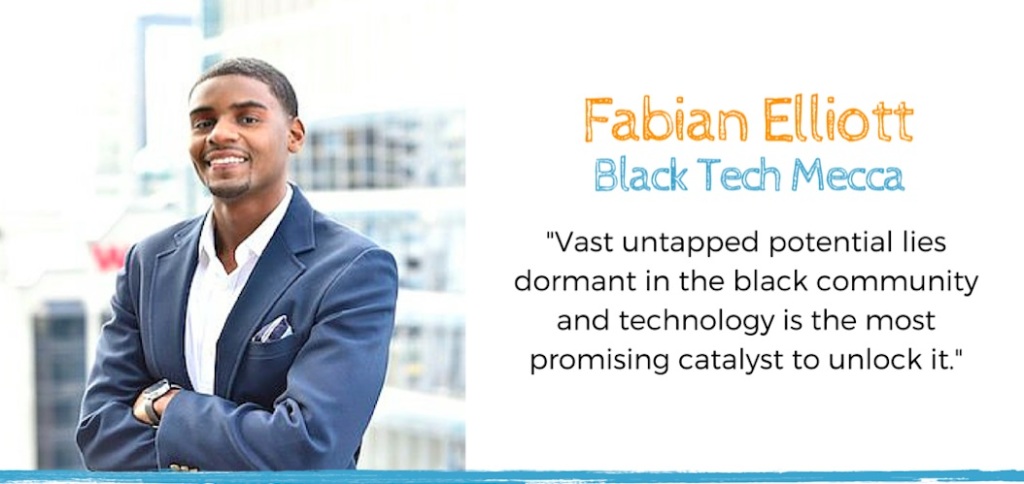Q&A with Co-Founder & CEO of Black Tech Mecca – Fabian Elliott
In this edition of Catalyst, we talk with Fabian Elliott, Co-Founder & CEO of Black Tech Mecca, to discuss the current state of Chicago’s Black Tech Ecosystem and the city’s role in expanding diversity and inclusion in tech. Black Tech Mecca is hosting the D.R.E.A.M. Tour on January 25th at 7pm in Chicago. You can watch the event live here.
Tell us about your background and inspiration for founding Black Tech Mecca. How has your experience in technology helped shape BTM’s mission and impact? What makes Chicago the right home for Black Tech Mecca?
Growing up in rural North Carolina, I would have never thought that my passion for marketing would put me on a crash course for technology via the Ad-Tech space. After landing my dream job at Google Chicago almost 6 years ago, there was not a manager or person in leadership in an office of 600 people that looked like me. Thus, I was exposed, first hand, to the bleak realities of the tech diversity and inclusion challenge. While I was fortunate to persevere and have a positive experience, I realized that not all my colleagues were having a similar experience and wanted to do something about it. This led me to get involved with the Black employee resource group, Black Googler Network, which I eventually went on to lead as the Global Co-Chair. In this role, the importance of a data-driven strategy to create change became clear to me. We were able to find success and make an impact through leveraging data to better understand the needs of Black Googlers around the world and launch solutions. This sparked my curiosity to investigate whether a similar approach could be used beyond the walls of a company and leveraged in cities and communities. From there, Black Tech Mecca was born.
Chicago has a dynamic mix of elements that make a strong case for Black Tech Ecosystem (BTE) development work to be pioneered here. The city is already a global powerhouse with a rapidly growing tech scene and a large influential Black community. Chicago has such strong assets that if growing a vital BTE can’t be done here, it will be difficult to do anywhere.
In October 2017, Black Tech Mecca released its Black Tech Ecosystem report. What did the report reveal about Chicago’s Black Tech Ecosystem?
The main themes revealed that although formidable challenges exist, there is a lot of promise and potential to create something special. I was surprised to discover that there is such a large critical mass of Black tech professionals; estimated around 40,000 making up 9% of the tech workforce. However, it was disappointing to realize how very little we know about Black tech entrepreneurs. There is little to no reliable data to paint a clear picture about them, compared to corporate professionals and those in the academic vertical, who we can find a little more data on.
What do you see as the future of Chicago as a tech hub? What steps do you believe are necessary to increase diversity and inclusion in Chicago’s tech ecosystem?
Chicago has a very unique opportunity to position itself as the premier inclusive tech hub in the country. Although many cities are in hot pursuit of this same goal, Chicago already has the diverse population to engage and has already won awards for creating great inclusive environments like for women entrepreneurs. There is also a very vibrant community of Black, Latino, LGBT, women, veteran, and other groups driving change.
To increase D&I in the ecosystem, it all starts with a solid assessment foundation that allows us to define a measurable vision and benchmark our progress toward achieving it. I believe that this data-driven approach will enable us to coordinate the right stakeholders and make a stronger case for the required resources to progress.

Our recent STEM Talent Index shows that despite Illinois’ strong STEM talent production overall, the state trails the national average for the share of degrees awarded to female, Hispanic or Latino, and African-American students. What can the state do to increase the share of STEM degrees awarded to underrepresented groups?
My answer is simple here. Invest. The state must put their money where their mouth is. There are proven initiatives and solutions that could help but remain critically under-resourced. In our research, we learned that Chicago Public School’s flagship Computer Science program CS4All has estimated that 3,000 credentialed computer science teachers are needed, but only 5 percent (about 150) are currently employed by CPS. They are one of many organizations in need of support.
Lastly, also focus on engaging more adults. A disproportionate amount of city resources go toward youth. Supporting more adult programs could also help spur the share of STEM degrees awarded to underrepresented groups.
You named the tour The D.R.E.A.M. Tour (Data Rules Everything Around Me). What impact do you believe data can have on increasing participation in the tech ecosystem among underrepresented groups? How can our readers support Black Tech Mecca and its mission?
The way data is driving the tech industry and with the rise of Machine Learning and Artificial Intelligence, we have an extraordinary opportunity to re-deploy these strategies to improve diversity and inclusion. It is one thing to leverage data for basic analysis, but imagine the possibilities of taking it a step further to deploy machine learning to obtain recommendations for new innovative solutions. Imagine what could be possible if we emulated the data driven ‘Smart City’ approach to create smarter, more inclusive tech ecosystems.
Catalyst readers can check out our latest Chicago report here and tune into the D.R.E.A.M. Tour Kick off at 7pm Thursday 1/25. Although the live event has sold out, a live stream will be available via YouTube on our channel. If you are intrigued by what you see, perhaps we can partner to drive change in Chicago’s tech ecosystem.
Watch
What We’re Reading
- Chicago’s surprising strength in the Amazon HQ2 race [Crain’s Business Chicago]
- Built in Chicago’s 50 Best Startups to Watch in 2018 [Built in Chicago]
- Here’s a smarter way to generate economic growth in metro Chicago [Crain’s Business Chicago]
- This is how women are really faring in Chicago tech [Crain’s Business Chicago]
- IL Tech Companies Raised $1.8B in 2017, Most Since the Dot-Com boom [Chicago Inno]
- Chicago VC deals top $1 billion for the first time since 2000 [Crain’s Business Chicago]
- Hey, Siri: Chicago wants in on Apple’s expansion plans [Built In Chicago]
- ‘Dreamers’ march in Chicago as Democrats dig in on immigration [Chicago Tribune]
- A Chicago Startup and BP Are Working to Help Women Return to the Workforce [Chicago Inno]
- Google eyes Chicago for up to 5,000-job office [Crain’s Business Chicago]
We’re Hiring:
Our 501c(3) Illinois Science and Technology Institute is hiring a Program Coordinator. Please share with any professionals who are passionate about impacting the next generation of Illinois’ STEM innovators. To learn more about the opportunity, click here.

